HOSPIGREEN – FIRST RENEWABLE ENERGY COMMUNITY OF PUBLIC CONSUMERS IN WALLONIA
Led by IDETA in collaboration with the companies e-NosVents and CERWAL, the HospiGREEN project is a Renewable Energy Community (REC) in the spirit of the Walloon decree of 2/05/2019. This decree defines a REC as a legal entity whose participants share electricity produced from local sources of renewable energy and whose primary objective is to provide environmental, economic, or social benefits to its participants.
The nonprofit organization HospiGREEN brings together public consumers only: the Hospital CHWaPi (Union and Notre-Dame Sites), the Regional Psychiatric Center Les Marronniers, the Nursing Home of the CPAS of Tournai Moulin à Cailloux and IDETA (headquarters and Negundo business center). Three production units supply the community with renewable energy: a wind turbine from the Tournai West wind farm (2.2 MW) and two photovoltaic production units (120kwc) installed on the roofs of the Negundo business center in Tournai West.
The CHWapi Hospital, the Psychiatric Center Les Marronniers and the rest home Moulin à Cailloux have significant energy needs but do not have sufficient space or infrastructure adapted to the installation of wind turbines or photovoltaic panels on their sites. Thanks to the establishment of the CER, its members can now benefit from a mix of production units that e-NosVents and IDETA make available to them and consume green energy.
In practical terms, this pilot project makes it possible to define and test a protocol for the exchange of data between the community and the distribution system operator. The optimization of energy flows and the synchronization of consumption with production are analyzed by the application of a distribution key and devices for monitoring the participants’ installations. The community benefits from specific network costs for the self-consumed volume, but this is not essential for the REC’s business model. Ultimately, this real-world active experience will provide a better understanding for all energy market players of the technical and socio-economic implications of collective self-consumption.
In a second phase, if the conclusions of the techno-economic study are positive, the renewable energy community could integrate other participants and other production units from Tournai West. HospiGREEN could thus open up to companies from the Tournai West economic hub, connected in medium voltage and selected after a call for applications. In the long term, if the Walloon Government defines a legislative framework, IDETA could perpetuate the initiative, or even consider extending it to the scale of Wallonia.
Beyond the economic benefits and the positive community dynamics it generates, collective self-consumption will promote the deployment of renewable energy production units. After the launch of eco-responsible local energy communities in the municipalities (Coleco project) and the economic activity parks of Picardy Wallonia (Zelda project), IDETA takes a new step with HospiGREEN, accelerates the energy transition of the territory and strengthens the security of supply on the territory.
Learn more:
- Notélé broadcast: https://www.notele.be/it61-media95958-hospigreen-la-premiere-communaute-d-energie-renouvelable-de-consommateurs-publics.html
- https://www.cwape.be/publications/document/4284
- https://www.rewallonia.be/les-projets/hospicer/













